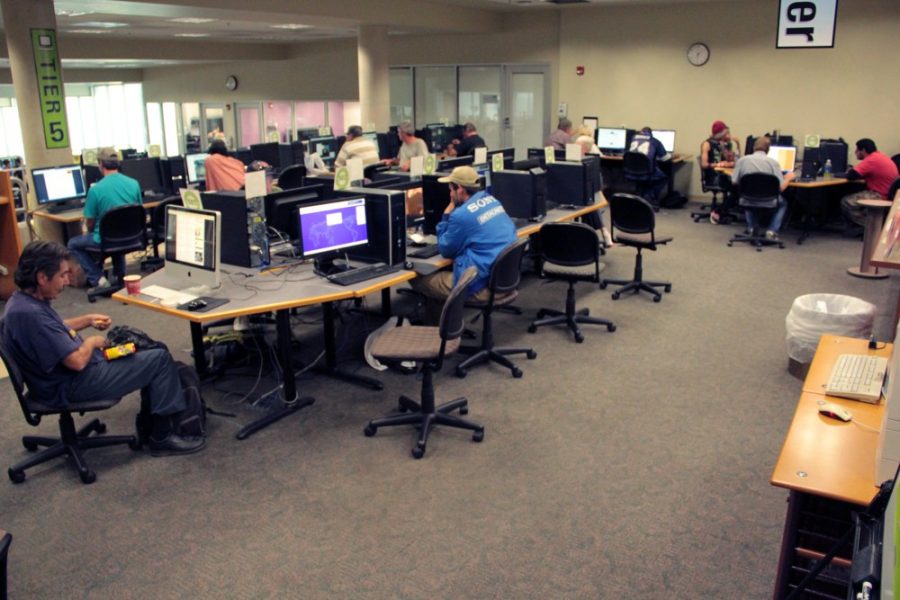UA Main Library employees were surprised last week to find their first case of bedbugs — an incident that cost the UA $3,500.
A library employee noticed a dead bug last Wednesday in the downstairs computer lab area open to non-UA affiliated community members. Unsure of what the bug could be, the employee called Facilities Management, according to Robyn Huff-Eibl, team leader for access and information services for the UA Main Library, Fine Arts Library, Science-Engineering Library and Arizona Historical Society Libraries and Archives. Huff-Eibl said a bedbug incident has never happened in the Main Library before.
Facilities Management identified the insect as a bedbug and, within 24 hours, blocked off the area and treated it for additional bedbugs that were found, according to Christopher Kopach, assistant vice president of Facilities Management.
University Termite and Pest Control, an outside company contracted by both the UA’s Risk Management Services and Facilities Management, disinfected the area and removed the bedbugs using chemical bait traps, chemical treatment, hot water extraction and upholstery cleaning.
“We worked very well together to get this issue resolved,” Kopach said.
The team also conducted a follow-up check where it searched surrounding areas in the library to ensure the bugs hadn’t spread further, Huff-Eibl said. As an extra precautionary measure, University Termite and Pest Control will inspect the library every week for a month to ensure the bedbugs are completely gone, rather than once a month, as is routine.
Paul Baker, a UA professor of entomology and urban extension entomologist, said there has been a resurgence of bedbugs in the last 10 years and a wave of them has come from the East Coast westward. Backpacks may have acted as carriers for the library bedbugs, he said. A student could have put their bag down in a location with bedbugs and carried them to the library, where the bugs then spread.
Baker said bedbugs have been found in movie theaters, buses and a variety of other locations. He added that a bedbug infestation has nothing to do with sanitation.
“Awareness is all we can do. If you become aware of it, you need to let somebody know,” Baker said. “The take-home message for the student population is: Just be aware of your surroundings.”
While the affected area was blocked off for treatment, Huff-Eibl said, the rest of the library and ILC remained open to the UA community. The library didn’t notify students of the incident because they were not advised to do so and because they said there weren’t any health or safety risks, according to Huff-Eibl. Any library equipment in the area was covered with bags until it was cleared by pest control, she added.
“We did the steps that we were advised to do immediately so that we wouldn’t have any sort of harm happen,” Huff-Eibl said.
However, some students said they would’ve liked to be notified of the incident.
Drew Carlson, a first year graduate student studying political science, said while the precautionary measures are good, the library should have also sent an announcement.
“It’s important to understand the entire situation of where we are,” Carlson said. “This isn’t necessarily, explicitly true for just students or just the library … you should have full understanding of what the risks are being in that area.”
Ishani Joshi, a biology sophomore, said the library should have put up signs in the area explaining the situation and what they did to take care of it.
“It should be part of their procedure to at least notify,” Joshi said, “just so we can be on the lookout too. Just in case we see them again we can take care of it faster if students knew about it.”
The necessary steps are being taken to prevent any future incidents with bedbugs, according to Huff-Eibl.
“We exist here to be open for the students so that they’ve got a great place to help with their education and learning environment. So if we’re not open, that prohibits us from doing our mission and serving the campus,” Huff-Eibl said. “So we’re doing everything we can to make sure that this does not happen again.”
— Brittny Mejia contributed reporting to this article
– Follow Stephanie Casanova @_scasanova_









